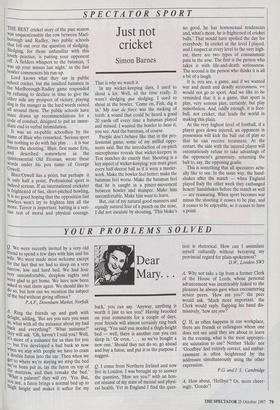SPECTATOR SPORT
Just not cricket
Simon Barnes
THE BEST cricket story of the past season was unquestionably the row between Marl- borough and Radley, two public schools that fell out over the question of sledging. Sledging, for those unfamiliar with this lovely practice, is putting your opponent off. A fielders whispers to the batsman, 'I Was up your missus last night,' as the fast bowler commences his run-up. Lord knows what they say in public school cricket, but the insulted batsmen in the Marlborough-Radley guile responded by refusing to declare in time to give the other side any prospect of victory, playing dog in the manger as the hard words rained all around them. The public schools have since drawn up recommendations for a code of conduct, designed to put an imme- diate end to verbal intimidation.
It was an ex-public schoolboy by the name of Blair who remarked, 'Serious sport has nothing to do with fair play . . . it is war Minus the shooting.' Blair, first name Eric, and described somewhere as the quintessential Old Etonian, wrote these words under his pen name of George Orwell.
Blair/Orwell has a point, but perhaps it is only half a point. Professional sport is indeed serious. If an international cricketer is frightened of fast, short-pitched bowling, it is no good hoping that the opposition fast bowlers won't try to frighten him all the More. Terror is important: batting is a seri- ous test of moral and physical courage. That is why we watch it. In my wicket-keeping days, I used to shout a lot. Well, all the time really. It wasn't sledging qua sledging. I used to shout at the bowler, 'Come on, Fish, dig it in.' My tour de force was the sucking of teeth: a sound that could be heard a good 20 yards off every time a batsman played and missed. I wanted the bowler to hear it, you see. And the batsman, of course.
People don't behave like that in the pro- fessional game, some of my miffed oppo- nents said. But the introduction of on-pitch microphones reveals that wicket-keepers in Test matches do exactly that. Shouting is a key aspect of wicket-keeping: you must greet every half-decent ball as if it were a master- work. Make the bowler feel better; make the batsman feel worse. Make the batsman feel that he is caught in a pincer-movement between bowler and stumper. Make him uncomfortable. Make him want to leave.
But, out of my natural good manners and equally natural fear of a punch on the nose, I did not escalate by shouting, 'This bloke's no good, he has homosexual tendencies and, what's more, he is frightened of cricket balls.' That would have spoiled the day for everybody. In cricket at the level I played, and I suspect at every level to the very high- est, there are two types of consummate pain in the arse. The first is the person who takes it with life-and-death seriousness. The second is the person who thinks it is all a bit of a laugh.
It is, you see, a game, and if we wanted war and death and deadly seriousness, we would not go to sport. And we like to be reminded that it is a game, that sport is play, very serious play, certainly, but play nonetheless. And, oddly enough, it is foot- ball, not cricket, that leads the world in making this plain.
At the very highest level of football, if a player goes down injured, an opponent in possession will kick the ball out of play so that he can receive treatment. At the restart, the side with the injured player will ostentatiously refuse to take advantage of the opponent's generosity, returning the ball to, say, the opposing goalie.
This is something that all spectators actu- ally like to see. In the same way, the hand- shakes after the match — when England played Italy the other week they exchanged boxers' handshakes before the match as well — are reassuring. When sport becomes war minus the shooting it ceases to be play, and it ceases to be enjoyable, so it ceases to have a point.


















































































 Previous page
Previous page